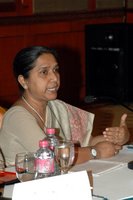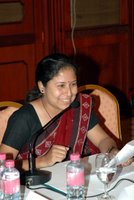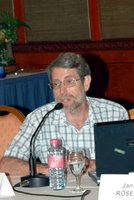Presentation: LWF field office experiences
Afternoon presentation from LWF/DWS field offices
Reports on water use and experiences were received from the offices in India, Nepal, Bangladesh and Cambodia. Brief run-downs the reports follow; for more details please click the appropriate links.
 India – report by Anjana Biswas
India – report by Anjana Biswas
Lutheran World Service India (LWSI) is assisting communities to increase their access to water when and where they need it. LWSI has been operational since 1974, implementing relief, rehabilitation, disaster preparedness and integrated development programs in several states of India.
There are a total 38 projects in 69 villages with 12,472 households. Projects include creation of drinking water resources (tube wells, hand pumps etc), waste-water management, training for people to disinfect water sources and the Million Wells scheme.
Please click here for more details.
Please click here for more information on the LWF/DWS India Program on the LWF Web site.
 Nepal – report by Mina Parajuli
Nepal – report by Mina Parajuli
Nepal is the second richest country in water in the world, yet still has the following water problems: increased pollution, water quality problems from arsenic, coli form, iron, lime etc, technology problems, source disputes, geographical situations, rapid urbanization, and lack of government commitment and good governance.
The LWF activities include installation of drinking water and irrigation infrastructure, gravity flow systems, hand pumps, drip irrigation, treadle pumps and overhead tanks.
Please click here for more details.
Web site of the LWF/DWS Nepal program.
Please click here for more information on the LWF/DWS Nepal Program on the LWF Web site.
 Bangladesh – report by Sabina Yasmein
Bangladesh – report by Sabina Yasmein
Bangladesh is a very small country, yet it has many rivers. However the land is becoming dryer and agriculture is being affected, people are losing jobs and becoming poor as a result. Flooding has had devastating effects and access to fresh drinking water is a problem in large cities, with arsenic contamination in many water supplies.
LWF has been active in ensuring that flood victims have access to clean drinking water. As many wells were contaminated by flood waters, LWF is running a well de-siltation program.
Web site of the LWF/DWS Rangpur Dinajpur Rural Service (RDRS) in Bangladesh.
Please click here for more information on RDRS on the LWF Web site.
 Cambodia – report by David Mueller
Cambodia – report by David Mueller
The LWF Cambodia program has the mission to empower poor and vulnerable individuals, groups and communities in rural areas in order to claim their universal rights to life with dignity.
LWF water projects in Cambodia include water and sanitation awareness, deep drilled wells and hand-pumps, shallow open wells, water catchments, family ponds, communal ponds, small-scale irrigation systems and water-pump user groups.
Please click here for more details.
Web site of the LWF/DWS Cambodia program.
Please click here for more information on the LWF/DWS Cambodia Program on the LWF Web site.
Reports on water use and experiences were received from the offices in India, Nepal, Bangladesh and Cambodia. Brief run-downs the reports follow; for more details please click the appropriate links.
 India – report by Anjana Biswas
India – report by Anjana BiswasLutheran World Service India (LWSI) is assisting communities to increase their access to water when and where they need it. LWSI has been operational since 1974, implementing relief, rehabilitation, disaster preparedness and integrated development programs in several states of India.
There are a total 38 projects in 69 villages with 12,472 households. Projects include creation of drinking water resources (tube wells, hand pumps etc), waste-water management, training for people to disinfect water sources and the Million Wells scheme.
Please click here for more details.
Please click here for more information on the LWF/DWS India Program on the LWF Web site.
 Nepal – report by Mina Parajuli
Nepal – report by Mina ParajuliNepal is the second richest country in water in the world, yet still has the following water problems: increased pollution, water quality problems from arsenic, coli form, iron, lime etc, technology problems, source disputes, geographical situations, rapid urbanization, and lack of government commitment and good governance.
The LWF activities include installation of drinking water and irrigation infrastructure, gravity flow systems, hand pumps, drip irrigation, treadle pumps and overhead tanks.
Please click here for more details.
Web site of the LWF/DWS Nepal program.
Please click here for more information on the LWF/DWS Nepal Program on the LWF Web site.
 Bangladesh – report by Sabina Yasmein
Bangladesh – report by Sabina YasmeinBangladesh is a very small country, yet it has many rivers. However the land is becoming dryer and agriculture is being affected, people are losing jobs and becoming poor as a result. Flooding has had devastating effects and access to fresh drinking water is a problem in large cities, with arsenic contamination in many water supplies.
LWF has been active in ensuring that flood victims have access to clean drinking water. As many wells were contaminated by flood waters, LWF is running a well de-siltation program.
Web site of the LWF/DWS Rangpur Dinajpur Rural Service (RDRS) in Bangladesh.
Please click here for more information on RDRS on the LWF Web site.
 Cambodia – report by David Mueller
Cambodia – report by David MuellerThe LWF Cambodia program has the mission to empower poor and vulnerable individuals, groups and communities in rural areas in order to claim their universal rights to life with dignity.
LWF water projects in Cambodia include water and sanitation awareness, deep drilled wells and hand-pumps, shallow open wells, water catchments, family ponds, communal ponds, small-scale irrigation systems and water-pump user groups.
Please click here for more details.
Web site of the LWF/DWS Cambodia program.
Please click here for more information on the LWF/DWS Cambodia Program on the LWF Web site.


0 Comments:
Post a Comment
<< Home